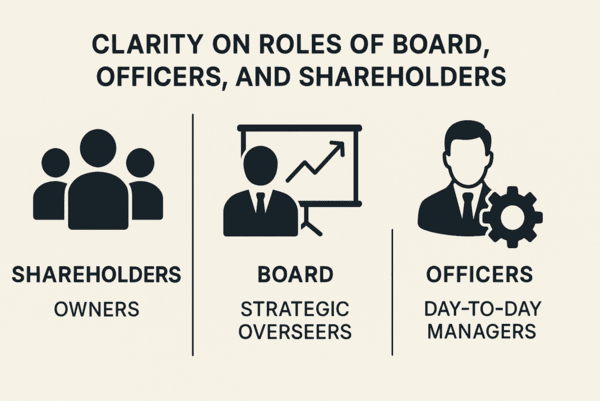
I get a lot of questions from clients about the roles of the board of directors, officers, and shareholders in a corporation. Each plays a distinct and essential role, and it’s crucial for these roles to be clearly defined in the company’s Bylaws—strong, well-drafted Bylaws provide clarity, which is key to preventing confusion and conflict. Here’s a brief outline:
Board of Directors: The board oversees the company’s strategic direction and is responsible for making key decisions, often outlined in the Bylaws, such as appointing and removing Officers, granting equity or stock options to employees, consultants, and advisors, and approving investment rounds and mergers or acquisitions. These decisions are typically executed through written Board Consents (if unanimous), or otherwise in live board meetings documented by minutes, as required by the Bylaws. The board must always act in the shareholders' best interests, and shareholders retain the power to elect and remove board members. The Board of Directors is not the same as an Advisory Board, which only provides advice (often in exchange for stock options), but has no actual authority in the corporation.
Officers: Officers — such as the Chief Executive Officer, President, Secretary, Chief Financial Officer, Chief Legal Officer, and Chief Operations Officer (anything "Chief") — form the operational backbone of the corporation. They manage day-to-day activities, implement board-approved strategies, set strategy within their functional areas, and ensure compliance with regulations. The CEO generally reports to the board and can be appointed or removed by the board. Officers make up the leadership team; other employees are typically not considered officers.
Shareholders: As company owners, shareholders have limited but critical voting rights on specific major decisions, including electing board members, amending Bylaws and Articles of Incorporation, approving the sale of the company or substantially all assets, and authorizing dissolution or liquidation. While shareholders do not participate in daily management (unless also an officer), their influence is significant, particularly in shaping board composition, which in turn impacts who holds key officer roles.
Each of these roles contributes uniquely to the company’s success, and role clarity is essential to avoid governance issues and support sustainable growth. This is where well-crafted Bylaws are invaluable. In my experience, companies often turn to their Bylaws at critical junctures, and having clear, robust Bylaws can prevent “constitutional crises” that arise from vagueness. Make sure your Bylaws effectively define the roles and powers of the Board, Officers, and Shareholders to keep your governance structure strong and stable.
If you’d like to discuss this further or need assistance with your corporate governance, including drafting or interpreting your Bylaws, book a free consult with me via Zoom here: https://calendly.com/lightlegal/legal-services-meeting